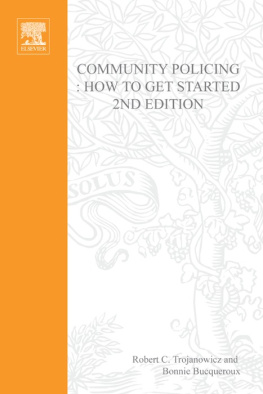Learning Matters
An imprint of SAGE Publications Ltd
1 Olivers Yard
55 City Road
London EC1Y 1SP
SAGE Publications Inc.
2455 Teller Road
Thousand Oaks, California 91320
SAGE Publications India Pvt Ltd
B 1/I 1 Mohan Cooperative Industrial Area
Mathura Road
New Delhi 110 044
SAGE Publications Asia-Pacific Pte Ltd
33 Pekin Street #0201
Far East Square
Singapore 048763
Editor: Julia Morris
Development editor: Jennifer Clark
Copy-editor: Sue Edwards
Production controller: Chris Marke
Project management: Diana Chambers
Marketing manager: Zoe Seaton
Cover design: Toucan Designs
Typeset by: Kelly Winter
Printed by: MPG Books Group
2012 Nicholas Blagden
First published in 2012
Apart from any fair dealing for the purposes of research or private study, or criticism or review, as permitted under the Copyright, Design and Patents Act, 1988, this publication may be reproduced, stored or transmitted in any form, or by any means, only with the prior permission in writing of the publishers, or in the case of reprographic reproduction, in accordance with the terms of licences issued by the Copyright Licensing Agency. Enquiries concerning reproduction outside these terms should be sent to the publishers.
Library of Congress Control Number: 2011945607
British Library Cataloguing in Publication Data
A catalogue record for this book is available from the British Library
ISBN: 978 0 85725 465 8
Acknowledgements
I would like to thank colleagues from Huddersfield University, Lincoln University and Nottingham Trent University. My experiences of training police officers contributed to some of the insights in this book and I would like to thank the cohorts of students I taught while at Huddersfield. I would also like to thank Jennifer Clark for staying patient with me and mum and Emily for additional proofreads. Any errors, of course, are mine alone.
This book is dedicated to my wonderful family, to mum, dad, my wife Emily and our beautiful boys, Dylan and Jake. I love you all and Im blessed to have you all in my life.
| Policing and psychology: an introduction |
This book is written at a time of change and uncertainty within the police force: government cuts, recruitment freezes and demands for increased public satisfaction and targets mean that job demands and pressure are likely to increase. As police management has become more professional and organised, there has become a greater appreciation of the contribution psychology can make to various aspects of policing. Indeed, psychological research has been influential in police training, police officer recruitment and selection, understanding stress and burnout, as well as contributing to specialist areas such as offender profiling and hostage-taking incidents (Kapardis, 2010). Perhaps one of the most important areas in which psychology has had an impact is in policepublic relations, for example interactions with the general public, victims and offenders. This has played a crucial role in police training, where police officers are taught important skills such as listening and communication, effective decision-making, conflict-resolution, stress awareness, and stereotype and prejudice formation (Reiser, 1982; Reiser and Klyver, 1987; Sprackman, 2000; Skolnick, 2008). This is important as Goldstein has noted that complaints arising from police-citizen contacts account for much of the attention the police receive (1994, p323).
Police work is thus influenced by a range of dynamic psychological factors and understanding these factors can help to inform various aspects of operational policing (Brewer and Wilson, 1995). The purpose of this book is to highlight some of the crucial ways in which psychology can be applied to policing. Psychology has been defined as the scientific study of the human mind and behaviour and is regulated in the UK by the British Psychological Society (BPS, 2011). As psychology is concerned with the mind and behaviour, its relevance to policing is obvious. For example, psychological processes are evident every time a police officer interacts with a victim, member of the public or an offender. Similarly, psychological processes can be noted when using interview skills, for example when undertaking an investigative or cognitive interview or when the police request the assistance of a crime profiler. Given that psychology and psychological research are focused on mind and behaviour, it is little wonder that psychologists are increasingly interested in crime, criminals, criminal justice and rehabilitation (Reiser, 1982).
PRACTICAL TASK
Think about the different ways in which psychology can be applied to policing, then compile a list of all the aspects of police work that are influenced by, or involve psychology to some degree.
Police work and psychology
Sir Robert Peel was instrumental in creating and introducing the Metropolitan Police Force, with his initial aims for the modern police service still influential today. The police service is today governed by a tripartite system that was set up by the Police Act 1964. This Act outlined clear roles and responsibilities for the Home Secretary, the Police Authority (or committee as it was known at the time) and the Chief Constable. The purpose of this tripartite system was to ensure that there is no direct political interference in operational policing, while at the same time ensuring that the police were accountable, effective and efficient in their service (Blake et al., 2010). Blake et al. (2010, p15) highlight that the current aims of the police service are as follows.
- To uphold the law fairly and firmly.
- To prevent crime.
- To pursue and bring to justice those who break the law.
- To keep the Queens peace.
- To protect, help and reassure the community.
- To be seen to do all things with integrity, common sense and sound judgement.
There are aspects of psychology that are applicable to all of the modern aims of policing. Indeed, the application of psychology to policing is nothing new and some have noted that the profession of police psychology was born at the National Symposium on Police Psychological Services, which was held by the USAs Federal Bureau of Investigation (FBI) in 1984 (Bartol, 1996). However, some suggest that it was much earlier than that, citing that Martin Reiser was the first person to be employed as a police psychologist in 1968. However, it may have been in Europe where the origins of policing and psychology lay. It has been suggested that psychologists were used as early as 1919 in Germany and that, in 1966, Munichs police department had a full-time police psychologist employed to train police officers in various patrol-related issues (Bartol, 1996). However, the fit between psychology and policing has not always been an easy one and scepticism still remains between psychologists and police officers. The police have had a tendency to view psychologists as fuzzy-headed, not grounded in reality, cloud nine thinkers and dogooders, while psychologists have viewed the police as insensitive and preferring brawn over brains (Ainsworth, 2002). Police perceptions may, in part, also be mediated by public views, which still tend to be that psychology is unscientific (Lilienfield, 2011).








